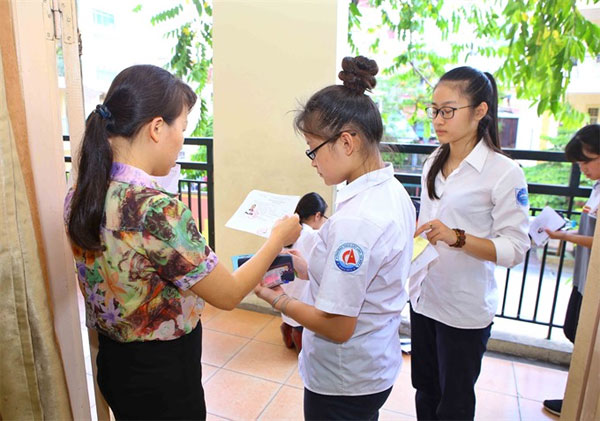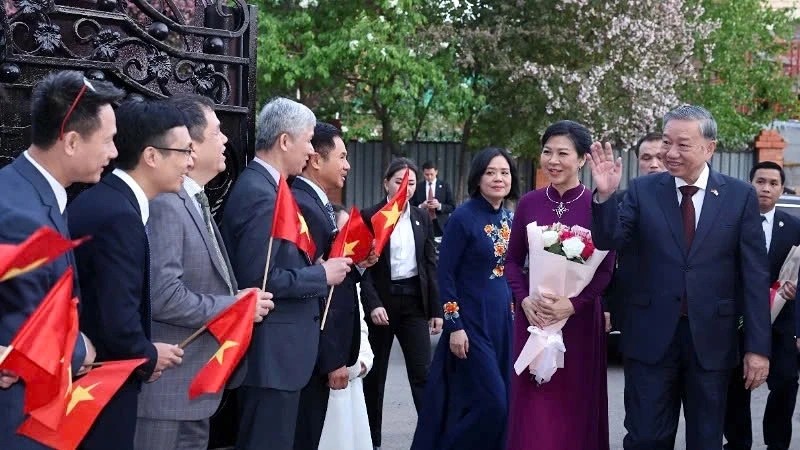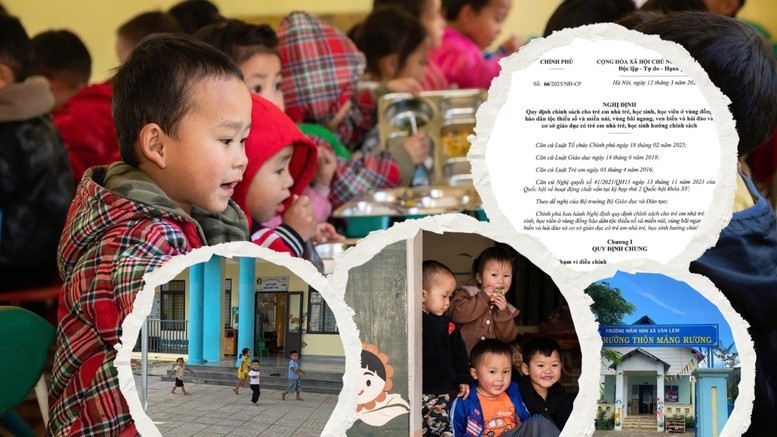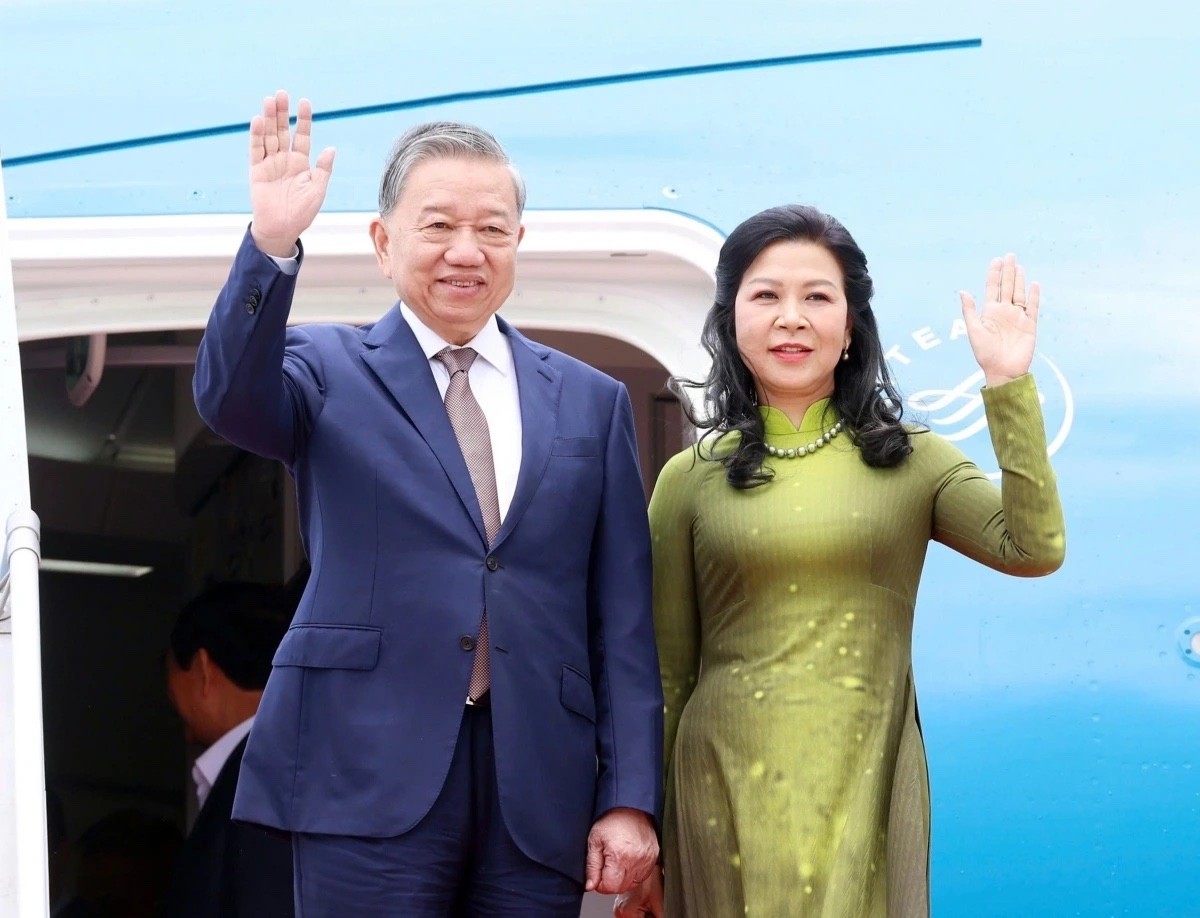Students battle for high school spots
The national high school entrance exam is still two months away, but Vu Minh Hien, a senior secondary school student in Hanoi, has started feeling the pressure.

An exam proctor at the Nguyen Du secondary school in Hanoi reviews exam sitters’ admit cards for the math test of the high school entrance exam in June 2017. — VNA/VNS Photo Minh Quyet
A 9th grader at the Van Ho secondary school, Hien has classes every morning and four extra classes on Tuesday and Thursday afternoons and Friday and Sunday evenings. Each class lasts from two to 2.5 hours, and the evening classes often finish at 8.30 pm.
“I already feel pressured as my school has started organised lots of mock tests,” Hien told Viet Nam News. “At the moment I have no time for extra-curricular activities.”
Thousands of students and parents in Hanoi are worried about the high school entrance exam as there is a surge in the number of exam sitters this year. The pressure is immense as 100,000 students are expected to sit the exam – up 24,000 from last year – while the public high schools in Hanoi can only accommodate 60 per cent of them, the Hai Quan (Customs) newspaper reported.
The other 40 per cent will have to settle for private schools, vocational schools and continuing education facilities, which are often considered “unofficial” and low-quality by Vietnamese parents.
The annual high school entrance exam in Vietnam consists of one standardised math and one standardised literature test. Each student gets to apply to two public high schools, and they often choose one requiring a high passing score as the first option and another which requires a much lower passing score as the second option to ensure they do not fail both.
This year’s exam sitters are more numerous because they were all born in 2003, the year of the Golden Goat according to the Chinese zodiac, and a good year to have children.
Not only are the students feeling pressured, but their parents are, too. Ha Thi Thuy, Hien’s mother, said that she and her colleagues are worried sick about their children’s exam.
“The university entrance exam will probably not be this nerve-wracking, because if they fail to enter one university, they will get into another,” she said.
“I don’t know what we are going to do if [Hien] fails his first-option school,” she said, adding that she doesn’t want to let him settle for the second option as the teaching quality there would probably be “disappointing”.
Apart from the 108 public high schools, Hanoi has some other specialised magnet schools that plan their own exams. Considered the top schools in the city, these specialised schools often receive many more applications than their recruitment quotas.
For the 2016-17 school year, for example, 10 students competed for each slot in specialised math classes at the Hanoi-Amsterdam High School. The rate was the same to enter the High School for Gifted Students of the National University of Education, and 1:9 for the Foreign Language Specialised School.
With such a high number of exam sitters this year, an official from the Ha Noi Department of Education said the department is considering whether the public high schools should increase their recruitment quotas, Nguoi Lao Dong (The Labourer) newspaper reported. One scenario is to ensure 62-65 per cent of the students will get to public high schools instead of 60 per cent as usual, he said.
The department is also planning to allow private and non-public high schools to increase their recruitment quotas by 10 to 20 per cent compared to previous years, he added.
Le Thi Thuy Nga, principal of the Dich Vong secondary school in Hanoi, said that the preference for public schools is one of the factors creating pressure for students.
“Only when the vocational schools are able to improve their teaching quality and give students practical training that meet society’s demands will they receive more students,” she told Zing online newspaper. “Then the parents will stop trying to stuff their children into the public high schools."
Ngo My Le, principal of the Khuong Thuong secondary school in Hanoi, told Hai Quan that her school is trying to provide consultation for students with different capability levels.
“We help the top students choose public schools within their reach, and advise parents of students with weak learning capacity to let them pursue vocational training,” she said./.
VNF/VNS
Recommended
 National
National
Vietnam News Today (May 11): Vietnam, Austria to Boost Cooperation in High-Tech Development, Innovation
 National
National
Vietnam News Today (May 10): Vietnamese Peacekeepers Honored with UN Medal in South Sudan
 National
National
Vietnam News Today (May 9): Vietnam Ready to Work With Russia to Elevate Relations
 National
National
Vietnam News Today (May 8): Vietnam Remains Committed to UNCLOS
Popular article
 National
National
Vietnam News Today (May 7): Vietnam Hosts Over 7.67 Million International Visitors in First 4 Months
 National
National
Vietnam News Today (May 6): Party Leader To Lam Meets Vietnamese Expatriates in Kazakhstan
 National
National
Boarding Kindergarten Children Supported with VND360.000/Month
 National
National



